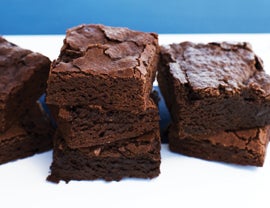Do Food Cravings Mean You're Nutrient Deficient?

Myth: You crave a certain food because you’re deficient in one of its nutrients.
If you’ve ever found yourself desperately pushing through a crowd to get at the double-chocolate cupcakes in a display window, you’re well aware of the power of food cravings. Some people suggest that such cravings are an effort by your body to correct a deficiency in a certain nutrient. In the case of chocolate, that might be magnesium—cocoa is considered a good source of this vital mineral.
The urge to dig into a tub of salted caramel ice cream, some would say, is an indication you are coming up short in bone-building calcium. And if you’re desperately searching for that strawberry shortcake in your fridge, are you deficient in vitamin C?
Probably not. Your hankering for certain foods is more likely caused by a mixture of social, psychosocial, cultural, and environmental cues rather than nutritional ones. Case in point, we most often yearn for foods laden with fat, sugar, and salt rather than nutrient-dense choices such as leafy greens and lentils. See also8 Foods Every Vegetarian Should Eat A study in The Journal of Clinical Investigation found that volunteers who received an infusion of fatty acids (similar to what you would get from “comfort foods”) while being exposed to depressing stimuli, such as dreary music, reported feeling less sad. And a British study looking at the state of mind of participants right before a craving struck found that they were prone to being anxious or bored and to experiencing a depressed mood.
These findings indicate that areas of the brain involved in emotions and moods are strongly affected by dietary elements that can impact cravings and the urge to eat. So when you’re feeling down in the dumps, a warm muffin may positively impact parts of your brain—and result in a learned craving for that item.
Want more nutrition and health info right at your fingertips? Check out the new Vegetarian Times Recipe Collection with more than 3,700 recipes plus lots of tips and cooking tricks!
Outsmart a Craving
Here’s how to outsmart cravings for foods laden with sugar, salt, or fat, which can lead to unbalanced eating and weight gain.
STEP OUT The next time you sense a craving for a brownie coming on, lace up your shoes instead. Research shows that a brisk walk can be enough to dampen the urge for sugary snack foods.
GET SLEEP Research suggests that people who get more hours of shut-eye tend to be slimmer.
KEEP NOTES A detailed food log can help you pinpoint craving trends. You can then take measures to fight back, such as using yoga to deal with stress that induces cravings.
UPGRADE Look for healthier substitutes for the foods you crave. For example, try salty tasting nori snacks instead of potato chips or sweet frozen grapes instead of candy.
See also Cut the Sugar in 3 Easy Steps
The Reality of Food Cravings
Cravings are more about wanting than needing. While your body can coax you into drinking more water when you’re parched, it’s not likely to urge you to eat more pumpkin seeds when you need magnesium. Psychological and external factors, though, are the main motivators that drive people to indulge in food cravings.
Canada-based Investigative Nutritionist Matthew Kadey, RD, sets us straight on misleading nutrition claims.